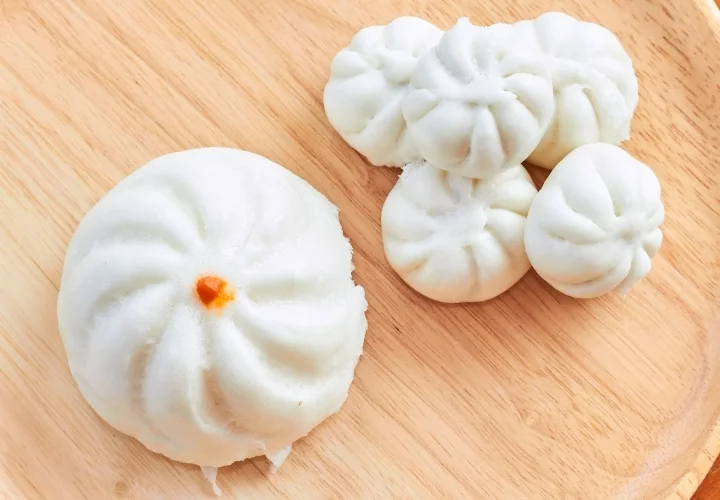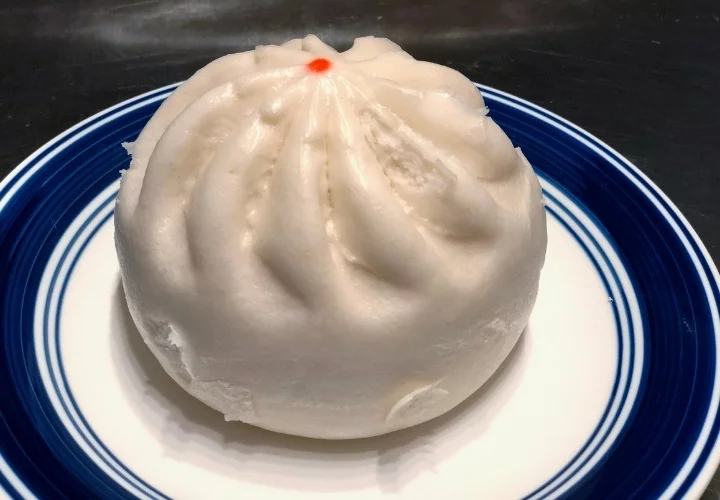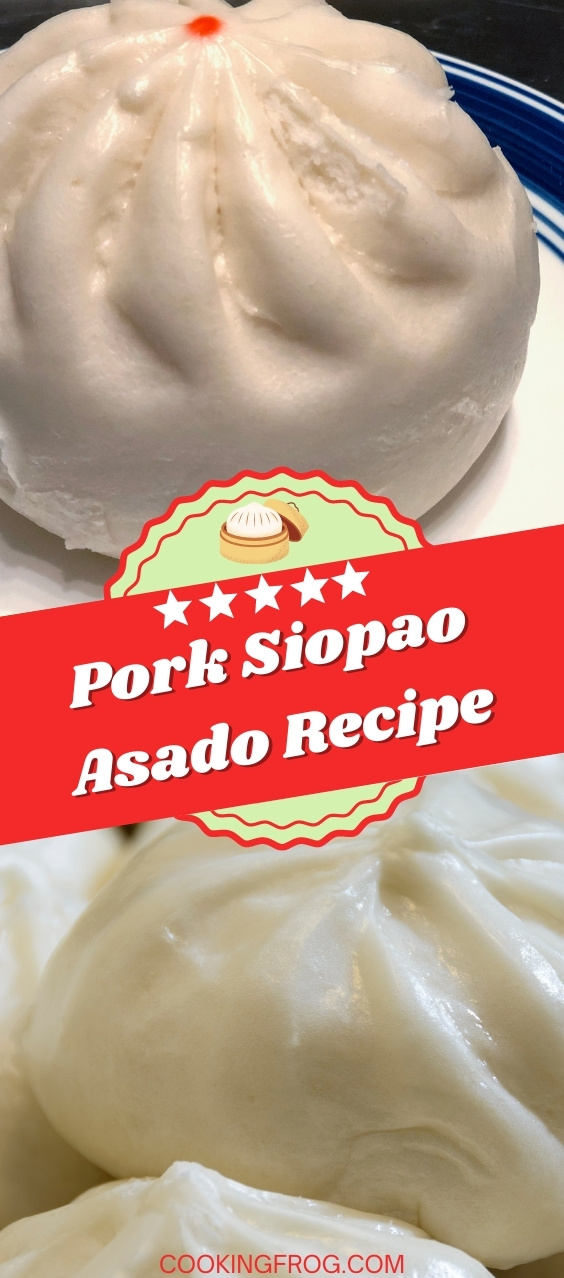Siopao Asado is filled with delicious pork filling and may be found practically anywhere in the country, from bakeshops and street sellers to prominent Filipino restaurants. Siopao, whether made at home or purchased from a store, could be eaten at any time of day or night.
You might confuse Siopao Asado with Vietnamese Banh Bao steamed pork buns, but they are not the same. Although they might look identical, this Filipino Siopao Asado doesn’t use Chinese sausage and quail eggs.
Pork Siopao Asado Recipe
The Meat Stuffing
- Siopao may be filled with various ingredients, but the two most common in Filipino cuisine are the bola-bola and pig Asado, both of which we’ll use in this dish.
- Pork shoulder is simmered till fork-tender and sweet and delicious in a combination of soy sauce, oyster sauce, sugar, and star anise. The liquid is thickened with a cornstarch slurry before being used as a sauce for the steamed buns.
- Allow the meat stuffing to cool completely before using it since the leaking steam may split the dough.
- It can be prepared ahead of time to make the process easier. Leave to cool fully before transferring to an airtight container and storing for up to 3 days in the refrigerator.
- For added variation, boneless chicken thighs can be used in place of the pork.
Dough for Siopao Asado
- Please be aware that the flour and sugar proportions in the dough preparation are in weight rather than volume (grams vs. cups). Therefore, to achieve exact measurements and a more consistent result, I recommend using a kitchen scale.
- Stir the heated milk, yeast, sugar, and salt in a small basin. Mix thoroughly and set aside for 5 to 10 minutes or until frothy. This procedure is used to “prove” that the yeast has activated.
- Ensure the milk temperature is between 105 and 115 degrees Fahrenheit. It’s possible that the yeast won’t activate if the milk isn’t warm enough. If the temperature is higher, the yeast may be killed.
- Stir to combine the flour, remaining sugar, and baking powder in a large mixing basin. Whisk until everything is completely combined.
- To whiten the buns, add the oil and a few drips of lime juice to the flour mixture. Next, fold in the yeast combination until it is completely mixed.
- Knead the dough for approximately 10 to 12 minutes in the bowl, or until it is smooth, elastic, and no longer sticky. A smooth, wrinkle-free steamed bun may be achieved by properly kneading the dough.
- Turn the dough into a ball, cover it in plastic wrap or a clean kitchen towel, and leave it aside to rise until doubled in size. Based on the room temperature, this will take around 2 to 2 1/2 hours.
Assembling the Bun
- Put the dough on a flat and lightly floured surface and roll it out. Next, make a long log out of it and cut it into ten pieces. A scale can also be used to verify uniform size.
- Shape each dough lump into a ball and place it on a baking sheet in a single layer. Leave the balls to rise for another half an hour or until puffy, covered with a clean kitchen towel.
- Press the dough balls into a 4 to 5-inch flat disk using a roller. To prevent the stuffing from escaping, make sure the sides are thinner than the middle.
- In the center, add a tablespoon or so of shredded pork. To make crimping simpler, push the stuffing away from the edges.
- Take the edges and crimp the dough around the filling. To thoroughly seal the bag, pinch and twist it. Arrange them on a baking sheet with a silicone mat or parchment paper and set them aside for another 10 minutes.
- To make the siopao whiter, add a couple of teaspoons of vinegar to the steaming water.
- Place the dough on a steamer in a single layer, about 1-inch apart, and steam for 15 to 20 minutes. Steam the buns on low heat to prevent buckling or inflating.
- Turn the heat off and leave the cover on for 3 to 5 minutes after steaming to avoid the siopao from breaking.
- Take the buns out of the steamer and place them on a plate with the sauce. Careful! It’s possible that the stuffing is too hot!
Share the image below to your Pinterest board if you like this amazing Filipino Siopao Asado Recipe!
List of Ingredients
Asado Filling
- 1 tbsp canola oil
- 1 tbsp cornstarch
- 2 tbsp oyster sauce
- 3 tbsp sugar
- 1/3 cup soy sauce
- 2 cloves garlic, peeled and minced
- 2-star anise
- 1 small onion, peeled and chopped
- 2 cups water
- 1 lb. of pork butt or shoulder, chopped into large chunks
Siopao Dough
- Sprinkle of lime juice
- 1/2 tsp salt
- 2 tsp dry instant yeast
- 2 tsp baking powder
- 2 tbsp sugar
- 2 tbsp vegetable oil
- 3/4 cup sugar 100 g
- 3.5 Cup all-purpose flour 500 g
- 260 ml of warm milk (between 105 and 115 F)
Directions
Making the Siopao Asado Stuffing
- Heat the oil in a saucepan over medium heat. Sauté until the onions and garlic are softened.
- Add the meat and heat until gently browned, rotating as required.
- 2 cups of water, soy sauce, oyster sauce, sugar, and star anise are added to the pan. Toss until everything is evenly distributed. Bring it to a boil, removing any foam that rises to the surface.
- Reduce heat to low, cover, and simmer for 1 hour, or until meat is fork-tender. Add extra water in half-cup increments to keep the liquid level at 1 1/2 cups.
- Take out the pork from the saucepan with a slotted spoon and set it aside to cool to the touch. Then, shred the meat with two forks.
- Collect and set aside roughly 1 cup of the braising liquid. Bring the shredded chicken back to a boil in the pot.
- Mix cornstarch and about 1/4 cup of water in a mixing dish. Whisk until the mixture is smooth and the cornstarch has dissolved. Toss 50 percent of the cornstarch slurry into the meat in the saucepan to evenly distribute it. Fry for an additional 1 to 2 minutes or until the sauce has thickened. Leave to cool after removing from pan.
- Stir the remaining 1 cup of braising liquid and the other half of the cornstarch slurry in a saucepan over medium heat. Bring to a boil, stirring frequently, for 2 to 3 minutes, or until the sauce has thickened. This is the siopao sauce.
Making the Dough
- Mix the milk, yeast, 2 tablespoons sugar, and salt in a mixing basin. Whisk in the sugar until it is completely dissolved. Allow to sit for 5 to 10 minutes, or until the combination has foamed up.
- Toss to combine the flour, 100 grams of sugar, baking powder, and vegetable oil in a large mixing basin. Mix thoroughly.
- Throw in a couple of drops of lime juice to the flour mixture, followed by the yeast mixture. Combine all the ingredients in a mixing bowl until dough develops. Knead and massage the dough until it is smooth and no longer sticky.
- Let to rise in a warm area for about 2 hours or until doubled in size, covered with a clean kitchen towel.
- Take the dough out of the bowl, set it on a clean work surface, and roll it into a long log.
- Divide the dough into ten equal portions with a knife, then roll each part into smaller balls. Allow for a half-hour rise by covering the dough with a clean dishtowel.
Putting it all Together
- Put one ball of dough on a clean work surface and roll it out into a 4 to 5-inch circle using a rolling pin, making sure the sides are thinner than the middle.
- In the middle, place roughly a spoonful of the meat filling.
- Grab the dough’s edges, fold around the filling, and twist to secure it completely. Lay the bun on parchment paper or wax paper. Continue with the rest of the dough and stuffing.
- Place the prepared buns on a flat baking sheet in a single layer, cover them with a kitchen towel, and leave to rise for another 10 minutes.
- Arrange buns in a single layer, one inch apart, in a steamer. Toss 2 tablespoons of vinegar into the boiling water (for whiter buns).
- Steam buns for 15 to 20 minutes on low heat. To stop the buns from collapsing, keep the cover on for 3 to 5 minutes.
- Take out of the steamer and top with the Asado sauce.




